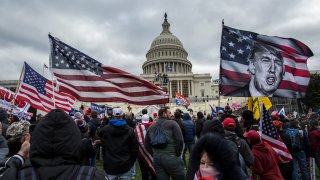
A federal appeals court sided Friday with the Justice Department in a case that could have upended hundreds of charges brought in the Capitol riot investigation.
A divided three judge panel of the U.S. Court of Appeals for the District of Columbia Circuit said a lower court judge was wrong in dismissing the obstruction of Congress offense after concluding that the rioters’ conduct wasn’t covered by the charge in three cases.
WATCH ANYTIME FOR FREE
>Stream NBC10 Boston news for free, 24/7, wherever you are. |
The decision, however, leaves open the possibility of further challenges to the charge, which has been brought in more than 300 cases in the Justice Department's massive Jan. 6, 2021, prosecution. The defendants who brought the challenge may also ask the full appeals court or the U.S. Supreme Court to review the decision.
The Justice Department has argued that the charge — punishing anyone who obstructs or impedes an “official proceeding” — clearly fits the conduct of the rioters who halted Congress' certification of President Joe Biden's 2020 election victory.
Get updates on what's happening in Boston to your inbox. Sign up for our >News Headlines newsletter.
U.S. District Judge Carl Nichols, an appointee of President Donald Trump, was the was the only lower court judge overseeing the Jan. 6 cases to dismiss the charge; every other judge who considered it said that it was correctly used.
Nichols found that the Justice Department stretched the law — which is part of a victim, witness, or informant tampering statute — beyond its scope to inappropriately apply it in the these cases. Nichols ruled that a defendant must have taken “some action with respect to a document, record, or other object” in order to obstruct an official proceeding under the law.

